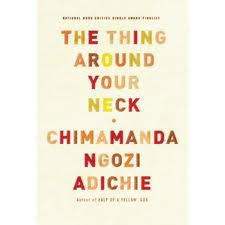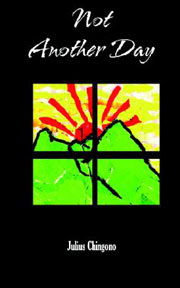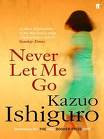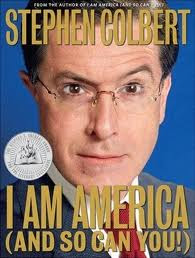
I really enjoyed Adichie’s novel HALF OF A YELLOW SUN, which seemed to me a fresh and interesting picture of a small corner of 20th century Africa. I was therefore excited to read her latest release, THE THING AROUND YOUR NECK, a collection of short stories.
It was, I’m sorry to say, a rather disappointing experience. I did appreciate the unselfconscious way in which Adichie writes about contemporary Nigeria, and in particular the Nigerian diaspora, and some of the stories were quite sweet, and affecting. I especially admired ‘Imitation,’ a story in which a Nigerian wife, unhappy in the US, eventually gets up the courage to insist her family move back to Lagos.
However, I found many of the stories to have an unpleasantly and obviously didactic edge. Now, I don’t mind if an author has an agenda, and feels a need to educate, but I’d appreciate it if they could try and be a little subtle about it. Here’s an example, a girl thinking about her sister while hiding from a riot outside:
She imagines the cocoa brown of Nnedi’s eyes lighting up, her lips moving quickly, explaining that riots do not happen in a vacuum, that religion and ethnicity are often politicized because the ruler is safe if the hungry ruled are killing one another
This is a very unsubtle elucidation of a very obvious point. Indeed, many of the ‘lessons’ seem rather second-hand and obvious, the sort of stuff that is taught in first year Politics classes at liberal American universities. There is even a really embarrassing section ‘educating’ us about how the British stole African artifacts during colonialism. I think I may have found it particularly toe-curling because I’ve just read THINGS FALL APART, in which a truly great Nigerian writer handles such issues with immense delicacy and insight.
As an avowedly African writer, I was also disappointed to see how very limited Adichie’s understanding of Africa is. The book deals almost exclusively with middle class black Nigerians, and where it steps out of this world tends to fall into caricature; there’s a particularly crude caricature of a Jewish American, and a portrait of a white South African that I found almost poisonous.
In an novel, this limited imaginative world may work quite well: we can accept why there is a single atmosphere, and a single sensibility. Short stories are a very different, and a very difficult medium, and for me, in THE THING AROUND YOUR NECK, Adiche’s limits became apparent.









